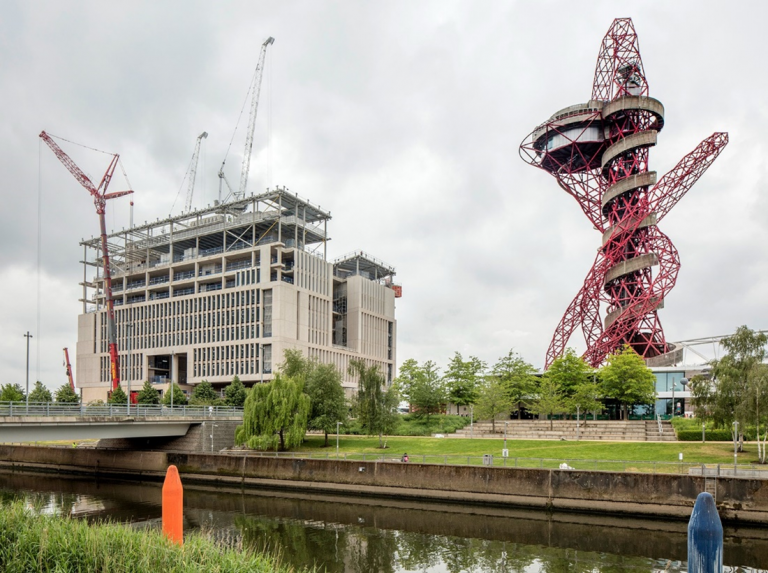How the new campus already champions sustainability
5 August 2021
The construction of the UCL East campus on Queen Elizabeth Olympic Park is setting new standards for sustainable solutions. Here we look at how the Marshgate building, in particular, will be sustainable.

Marshgate, which is part of the first phase of UCL’s new campus in east London, will be an environmentally responsible building.
The development features key sustainable elements, from rainwater harvesting and underground cycle storage, to low energy LED lighting and highly efficient mechanical ventilation. The installation of heating and cooling technology will retain energy and optimise indoor air quality in a bid to support health and wellbeing.
Construction company Mace has already been supporting UCL’s bold ambitions to deliver UCL East Marshgate as a ‘living lab’ centred around sustainability, by focusing on promoting green outcomes and environmental consciousness.
Through design, construction and on-site operation, the project team have supported clean energy by keeping running costs and energy consumption to a minimum, ensuring technologies on-site are economically viable while minimising health and safety risks.
For Ben Stubbs, Senior Sustainability Manager at UCL, it is very important for UCL East’s constructors to be just as mindful of sustainability as the university is: "UCL has set ambitious targets to reduce its environmental impact as part of ‘Change Possible’ – our sustainability strategy. This includes net zero carbon buildings by 2024 and being fully net zero carbon across the institution by 2030.
"As a major new campus, UCL East is critical to achieving this – as well as having an opportunity to lead the way for the university as a whole. And our contractors have a crucial role to play in helping deliver the vision, ensuring that we find ways to optimise the benefits of these buildings throughout their lifecycle."
Impact on the construction industry
Mace’s actions on sustainability are showing the direction that the construction sector is currently taking towards being more sustainable throughout a project, with implications for the future of construction, Stubbs also points out. “Mace have shown leadership and ambition in this area, announcing that they became a net zero carbon business in January 2021.”
“UCL works closely with the Mace team, ensuring that the impacts of their activities at UCL East are measured, monitored and reduced as far as possible. This includes innovative approaches to materials use as part of a circular economy approach, as well as facilitating the integration of digital technologies to assist with long term management.”
So far, these measures have enabled the project team to save 17.3+ cubic metres of timber waste and 1,200 tonnes of carbon emissions.
Links
Click here to find out more on Mace's website
Photo credit: Morley von Sternberg
 Close
Close

